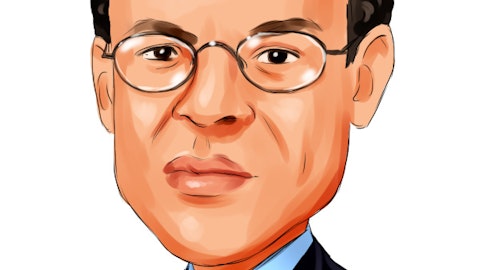Tyson Bauer: Okay. In your 10-K regarding the reverse split, it appears that even though it is until November 15, you will make a decision or a split, if it were to occur, would occur on the end of October, which the implication is if you have to have 10 days above $1, that would have to occur within the next four weeks. So…
Rob Capps: Yeah. You’re right about that.
Tyson Bauer: Scenario is that we have a reverse split, one for 10, just throwing that out there because that was in the proxy, will occur or would likely occur at the end of October?
Rob Capps: That is not an unreasonable assumption.
Tyson Bauer: Okay. Oil, $90. Heating oil [dropped] (ph) 40% since July. A lot of tailwinds are building that would be favorable for Seamap. And just to give the listeners a little sense, when your major competitor left the market a year ago, a lot of these decisions on whether or not you get a contract or not is whether the ultimate customer just wants to go ahead and place that order. It’s not really a competitive situation where you’re going against somebody else as we’ve seen in years past.
Rob Capps: Yeah. As it relates to source controllers, that is definitely the case. We were pretty much the only game in town. We do have some competition for the positioning systems, BuoyLink, and we do have some competition for the streamer systems, but we are focused more on the high resolution, three-dimensional applications used for survey purposes more than deepwater exploration. So we don’t go head-to-head with the deepwater streamer systems. So we do have some competition there, but it’s pretty thin, it’s fair to say.
Tyson Bauer: Okay. And yourself and Mark are not on the Board, correct?
Rob Capps: I’m on the Board. Mark is not.
Tyson Bauer: You’re on the Board. The Board is going to ask for your recommendation, being the CEO, and the CFO’s recommendation on outlook and financials. Are you willing to share what you would recommend? Even though that — there’s only one cog in the decision that the Board will make ultimately in regards to the preferred and going forward?
Rob Capps: Yeah. No, I don’t think we’re going to comment on that. The Board as a whole will make that decision, so it wouldn’t be appropriate for me to comment on that.
Tyson Bauer: Okay. Thank you, gentlemen.
Rob Capps: You bet.
Operator: Thank you. Our next question comes from the line of Ross Taylor with ARS Investment Partners. Please proceed with your question.
Ross Taylor: Always hard to follow Tyson since he asks all the good fundamental questions. So Rob, I’m just going to — I’m going to voice some thoughts here. The preferred is actually pretty damn good paper. In fact, it’s really good paper for you guys. And there’s no way you can go into the marketplace. You paid off a term loan that was, what, [12.9%], I think it was? This preferred is almost 400 bps under that. The fact that you guys and the Board might choose not to pay that off, every time you do that, I mean as an equity holder, I’ve sat here forever waiting for you guys to get it right. And you’re close to getting it right, and I have this feeling you’re about the snatch defeat from victory because what if I’m a preferred holder and I get two directors, the first thing I’m telling my directors to do, hire a banker.
And there’s no way, even with your plans and your confidence, there is that hesitancy, you hear it in your comments, that makes it impossible for this Board to say no to any deal that that banker found that would make the preferred holders whole and the equity holders walk away with next to nothing. And so it’s important. Let’s get that paper off the back of the common holders, it’s just — it’s straightforward. It’s — you can’t borrow at 9%. And in fact, you should get to get it going, and that paper is better than going to the bank. I mean eventually, you’ll be able to go to the bank and probably borrowing them high single digits at this point in this environment. And it frustrates me, and I just — I sense that the common holder is just going to be asked to hold a bag and you’re going to do a reverse split, get the stock above $1.
But in reality, that $8 million, $9 million in value that’s attached to the common right now is basically there on the hope that you guys get this thing worked out with the preferred holders. So you are on the Board, and I’ve known you for a long time, and I know you’re a good person and a smart person, and I can’t believe that you and this Board are going to let this situation go where you defer the payment again because, as I said, I’m confident Tyson is a smart guy, and I’m sure some of those preferred holders talk to Tyson. And I’m sure they’re pretty confident that this company is worth somewhere between $26 million and $50 million or more. And if it’s — if they sell it at $50 million, the preferred holders walk away with everything, and you can’t let that happen.
Can you?
Rob Capps: Ross, I hear your comments and I take those into consideration. So I hear you.




